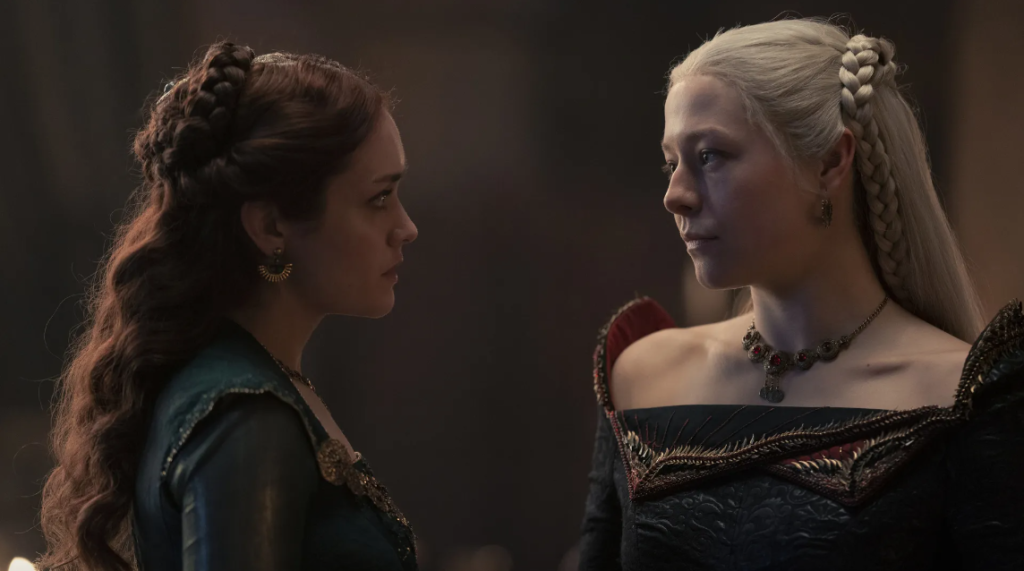“The only thing that could tear down the house of the dragon was itself.”
Based on George R. R. Martin’s novel Fire & Blood, the dense historical text (much like Tolkien’s The Silmarillion) which chronicles the Targaryen dynasty, prequel House of the Dragon charts the fifth Targaryen king’s rule and the subsequent warring over the succession of the Iron Throne. The ambitious show delves into a historical Westeros, primarily centring on the ancient House of the Targaryens (and also the supporting noble Houses of Velaryon, Hightower and Strong) and their individual fiery conflicts spanning decades – complete with multiple time jumps, setting itself apart from flagship HBO series Game of Thrones.
Centering on the amiable King Viserys I Targaryen (Paddy Considine) and his complicated succession for the throne, The House of the Dragon explores the complicated friendship-turned-rivalry of heir Princess Rhaenyra (Milly Alcock/Emma D’Arcy) and Queen Alicent Hightower (Emily Carey/Olivia Cooke). With Westeros following the sexist customs of male-led succession, the long-held question mark over Rhaenyra’s claim to the throne is further challenged by the sons of Queen Alicent. With disinherited Prince Daemon (Matt Smith) also stirring up trouble, irreparable cracks begin to show in the once agreeable ruling House.
Harking back to earlier seasons of Game of Thrones, House of the Dragon is a smaller and more contained tale focusing on the strained family dynamics and lines of succession of the fiery Targaryens (à la Logan Roy). The series is a slow-burn affair far more concerned with politicking, court intrigue and (eventually) scheming than the high budget battles and fantasy elements of its predecessor, even though there are excitedly more dragons this time round. It’s also as moody and serious as Jon Snow, with the majority of the episodes laying the tumultuous foundations for the infamous Targaryen civil war. This approach (coupled with the deliberate pacing) may prove divisive for newer fans, but there’s an undeniably gripping quality to the evolving dynamics throughout episodes 4-6 thanks to the central performances and themes explored.
At the heart of the series lays heartbreaking duty, forbidden love, dangerous affairs, outdated customs and compelling shifts in allegiances, all wrapped in an intriguing character-led drama. “A woman would not inherit the Iron Throne because that is the order of things” Princess Rhaenys Velaryon tells Rhaenyra, and it’s this thread on gender dynamics – the uphill battles women face in such an aggressively patriarchal kingdom – in which their fate of arranged political marriages and dangerous labours to produce male heirs seems inevitable – which proves the main catalyst for the conflict. In the latter episode, this power struggle over the Iron Throne becomes much more apparent between Rhaenyra and Alicent following an integral time jump, and it’s here where events truly heat up.
Just like Game of Thrones, there’s complex characters a plenty – complete with consistently evolving alliances, bloody betrayals and more incestuous dalliances (do we really need more?!) The brilliant changing dynamic between Milly Alcock/Emma D’Arcy and Emily Carey/Olivia Cooke is one of the more fascinating aspects of the show, along with Matt Smith’s contemptuous and resentful, but also complex, performance as Daemon – who’s undoubtedly going to prove a major player in the conflict to come. It’s also refreshing to see Paddy Considine’s Viserys I as an honourable King who’s striving for peace and unity in the Kingdom (and his unruly family). However, the burden of ruling and court weigh heavy on him, and he often turns a blind eye to what’s truly happening around him.
It’s clear to see that HBO has spared no expense with the lavish production, wardrobe and visual effects budget, with bigger and more brutal dragons soaring across the skies. We finally even get a glimpse at the infamous dragon pit, a weirwood tree in King’s Landing and another spectacle of a wedding, along with the inclusion of more High Valyrian spoken throughout the majority of Rhaenyra and Daemon’s conversations.
It’s a fascinating delve into the history of Westeros and King’s Landing, also with a sprinkle of hints of things to come, with mention of a Great Winter, the Prince That Was Promised and an inclusion of a certain Valyrian steel dagger. The costumes are also intricately detailed, with an abundance of dragon scale detailing and motifs woven throughout the various clothing. It’s also a welcome treat to hear Ramin Djawadi iconic score once again!
Verdict
House of the Dragon is a slow-burn but compelling delve into the complex dynamics and power struggles within House Targaryen, with more tension then you can shake a longsword at. The shifting allegiances truly come into play midway through the series, and thanks to the central performances, prove a gripping tale within the doomed bloodline. While the deliberate pacing and character-driven drama might not do much to win new fans over, it’s certainly good to be back in Westeros once again for this long-term fan!




